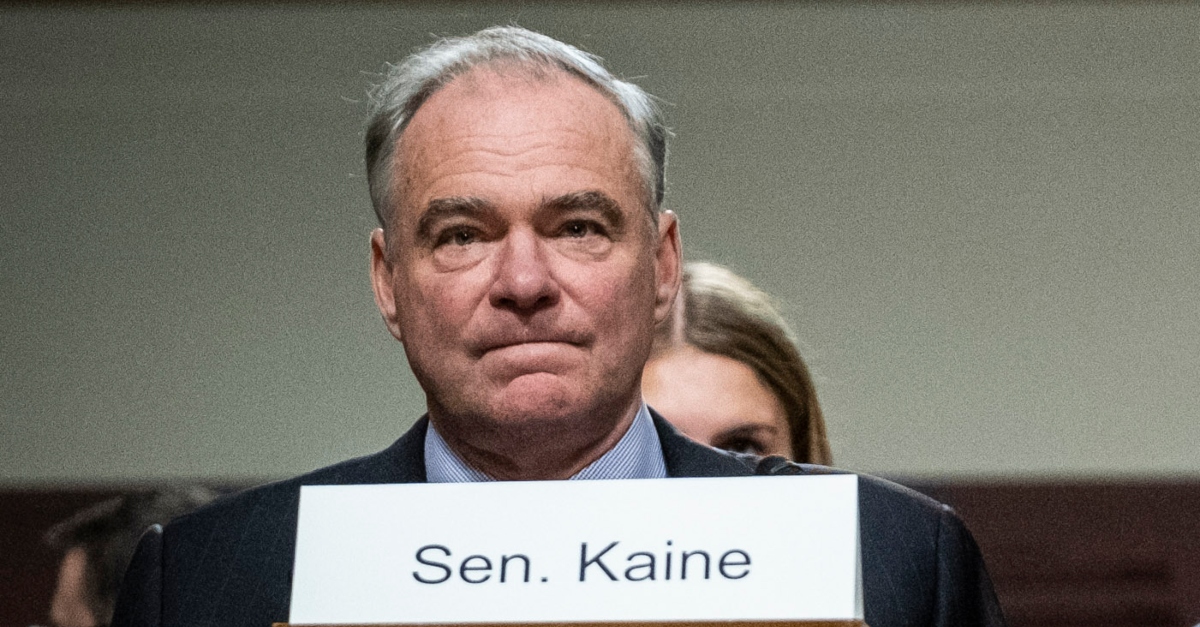
A bipartisan bill aimed at reining in the U.S. president’s ability to unilaterally use military force in the Middle East was introduced in the Senate on Wednesday, less than a week after President Joe Biden, without congressional approval, ordered a series of airstrikes targeting facilities used by Iranian-backed militia groups on Syria’s Iraqi border.
The bill was touted as way to “formally end the authorizations for the Gulf and Iraq wars.”
Democratic Sen. Tim Kaine of Virginia and Sen. Todd Young, a Republican from Indiana, introduced the measure, which would repeal the Authorization for Use of Military Force Against Iraq Resolutions enacted in 1991 and 2002. It would not repeal the Authorization for Use of Military Force resolution enacted in 2001 in the wake of the Sept. 11 terrorist attacks.
According to the legislation “recent presidential administrations have maintained that the 2002 AUMF only serves to ‘reinforce’ any legal authority to combat ISIS provided by the [2001] Authorization for Use of Military Force,” therefore the 1991 and 2002 resolutions are “not independently required to authorize any such activities.”
The last time the U.S. actually declared “war,” thus giving the president unencumbered use of the entire U.S. military, was during World War II in 1942. All subsequent “wars” such as those in Vietnam, the Gulf, and Iraq were fought under narrow authorizations granted to the commander in chief through AUMFs.
According to a 2018 memo from the Congressional Research Service (CRS), despite the 2001 AUMF being crafted to target those responsible for 9/11, U.S. presidents have relied on it to justify more than 40 military operations in 19 different countries.
“Last week’s airstrikes in Syria show that the Executive Branch, regardless of party, will continue to stretch its war powers,” Kaine, Hillary Clinton’s former running mate, said in a statement obtained by Law&Crime. “Congress has a responsibility to not only vote to authorize new military action, but to repeal old authorizations that are no longer necessary. The 1991 and 2002 AUMFs that underpinned the war against Iraq need to be taken off the books to prevent their future misuse. They serve no operational purpose, keep us on permanent war footing, and undermine the sovereignty of Iraq, a close partner. I call on Congress to promptly take up this measure and for the Biden Administration to support it to finally show the American people that the Article I and II branches can work together on these issues.”
“It has been thirty years since the first Gulf War began and nineteen years since the United States went back into Iraq,” Young also said in statement, agreeing with Kaine. “In the years since, Congress has been operating on autopilot when it comes to our essential duties to authorize the use of military force. The fact that authorities for both of these wars are still law today is illustrative of the bipartisan failure of Congress to perform its constitutionally-mandated oversight role.”
“Today, Senator Tim Kaine and I have re-introduced our bipartisan legislation to continue our fight to repeal these outdated war authorities. Congress must not shy away from this debate and I look forward to working with my colleagues on the Senate Foreign Relations Committee to advance this important legislation,” he added.
The repeal bill comes after lawmakers from both parties expressed dissatisfaction with the Biden administration’s failure to communicate with Congress prior to ordering the airstrikes, only briefing Senate aides about the rationale on Tuesday.
Sen. Chris Murphy (D-Conn.) told Politico on Tuesday that he literally sat-in on the staff briefing earlier in the day because it was the only way for him to hear directly from the administration, but the rationale offered was not satisfactory.
“I still need to be convinced that any president has the authorization required to take a retaliatory strike, especially outside of Iraq,” he said.
Other Senators who signed onto the bill as co-sponsors included Sens. Tammy Duckworth (D-Ill.), Mike Lee (R-Utah), Chris Coons (D-Del.), Chuck Grassley (R-Iowa), Rand Paul (R-Ky.), and Dick Durbin (D-Ill.).
[image via Pete Marovich/Getty Images]